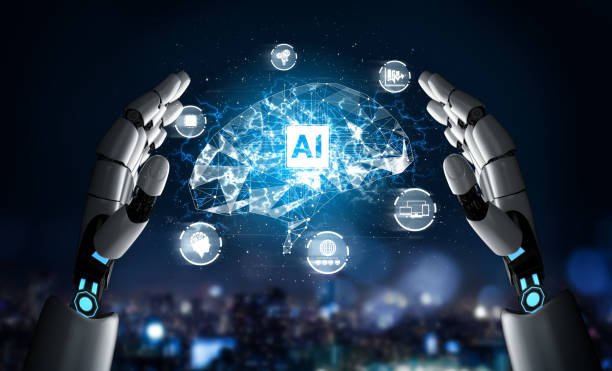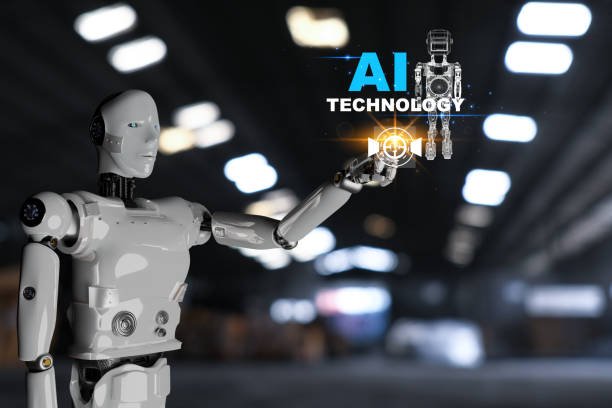- September 25, 2023
- Posted by: saeed.z.m
- Category: Blog

The Impact and Future of AI Applications in Various Industries
Artificial Intelligence AI Applications has rapidly transformed from a futuristic concept into a practical tool that significantly influences multiple industries. As AI technology evolves, its applications become more sophisticated and diverse. This article explores the critical impact of AI across various sectors and envisions the future trajectory of this transformative technology.
Healthcare: Revolutionizing Diagnostics and Treatment

In the healthcare sector, AI is pivotal in enhancing diagnostic accuracy, personalizing treatment plans, and streamlining administrative processes. Machine learning algorithms analyze vast datasets to identify patterns and predict patient outcomes, significantly improving early diagnosis and treatment effectiveness.
Key Applications:
- Medical Imaging: AI algorithms enhance the accuracy of interpreting medical images, aiding in the early detection of conditions like cancer, neurological disorders, and cardiovascular diseases.
- Drug Discovery: AI accelerates the drug discovery process by predicting how different compounds interact with targets, reducing the time and cost of bringing new drugs to market.
- Telemedicine: AI-powered platforms facilitate remote consultations and monitoring, making healthcare more accessible and efficient.
Finance: Enhancing Risk Management and Customer Experience

AI has revolutionized the finance industry by automating complex processes, improving risk management, and enhancing customer experience. AI technologies are reshaping financial services, from fraud detection to personalized financial advice.
Key Applications:
- Fraud Detection: AI systems analyze transaction patterns and detect anomalies that may indicate fraudulent activities, protecting both institutions and customers.
- Automated Trading: AI-driven algorithms analyze market data and execute trades at optimal times, increasing efficiency and profitability.
- Personalized Financial Services: AI uses data analytics to offer customized investment advice and financial planning, catering to individual customer needs.
AI Applications Manufacturing: Driving Efficiency and Innovation

In manufacturing, AI Applications are pivotal in optimizing production processes, reducing downtime, and enhancing product quality. Predictive maintenance, robotic automation, and quality control are key areas where AI significantly impacts.
Key Applications:
- Predictive Maintenance: AI predicts equipment failures before they occur, allowing for timely maintenance and reducing costly downtime.
- Robotic Process Automation (RPA): AI-driven robots automate repetitive tasks, improving efficiency and precision in manufacturing processes.
- Quality Control: AI systems inspect products for defects more accurately and consistently than human inspectors, ensuring higher quality standards.
Retail: Personalizing Customer Experience
Retailers leverage AI Applications to enhance customer experience, optimize inventory management, and streamline operations. AI technologies enable personalized recommendations, improve supply chain efficiency, and support dynamic pricing strategies.
Key Applications:
- Personalized Shopping: AI analyzes customer behavior and preferences to provide customized product recommendations, enhancing the shopping experience.
- Inventory Management: AI forecasts demand more accurately, optimizing inventory levels and reducing waste.
- Chatbots and Virtual Assistants: AI-powered chatbots assist customers with inquiries and support, improving service efficiency.
Transportation and Logistics: Optimizing Operations
AI is transforming transportation and logistics by optimizing routes, reducing fuel consumption, and improving safety. Autonomous vehicles, smart logistics, and traffic management systems are some areas where AI is making a notable impact.
Key Applications:
- Autonomous Vehicles: AI Applications enables self-driving cars and trucks, promising safer and more efficient transportation.
- Route Optimization: AI algorithms optimize delivery routes, reducing fuel consumption and delivery times.
- Supply Chain Management: AI enhances supply chain visibility and efficiency, ensuring timely and cost-effective delivery of goods.
The Future of AI: Ethical Considerations and Innovations
As AI Applications continue to evolve, addressing ethical considerations and potential societal impacts is crucial. Issues such as data privacy, algorithmic bias, and job displacement need to be carefully managed. Future innovations in AI are expected to focus on enhancing interpretability, accountability, and fairness in AI systems.
Potential Developments:
- Explainable AI (XAI): Efforts are underway to make AI systems more transparent, enabling users to understand and trust their decisions.
- AI in Climate Change Mitigation: AI is being explored for its potential to model climate change impacts and optimize energy use, contributing to sustainability efforts.
- Integration with Quantum Computing: Combining AI and quantum computing could exponentially increase computational power, unlocking new possibilities in various fields.
Conclusion
AI Applications are a transformative force across industries, driving innovation and efficiency. As we look to the future, it is essential to harness the potential of AI responsibly, ensuring that its benefits are broadly shared and its challenges are proactively addressed. The continued development and integration of AI technologies promise to revolutionize industries, improve lives, and shape the future of our world.

